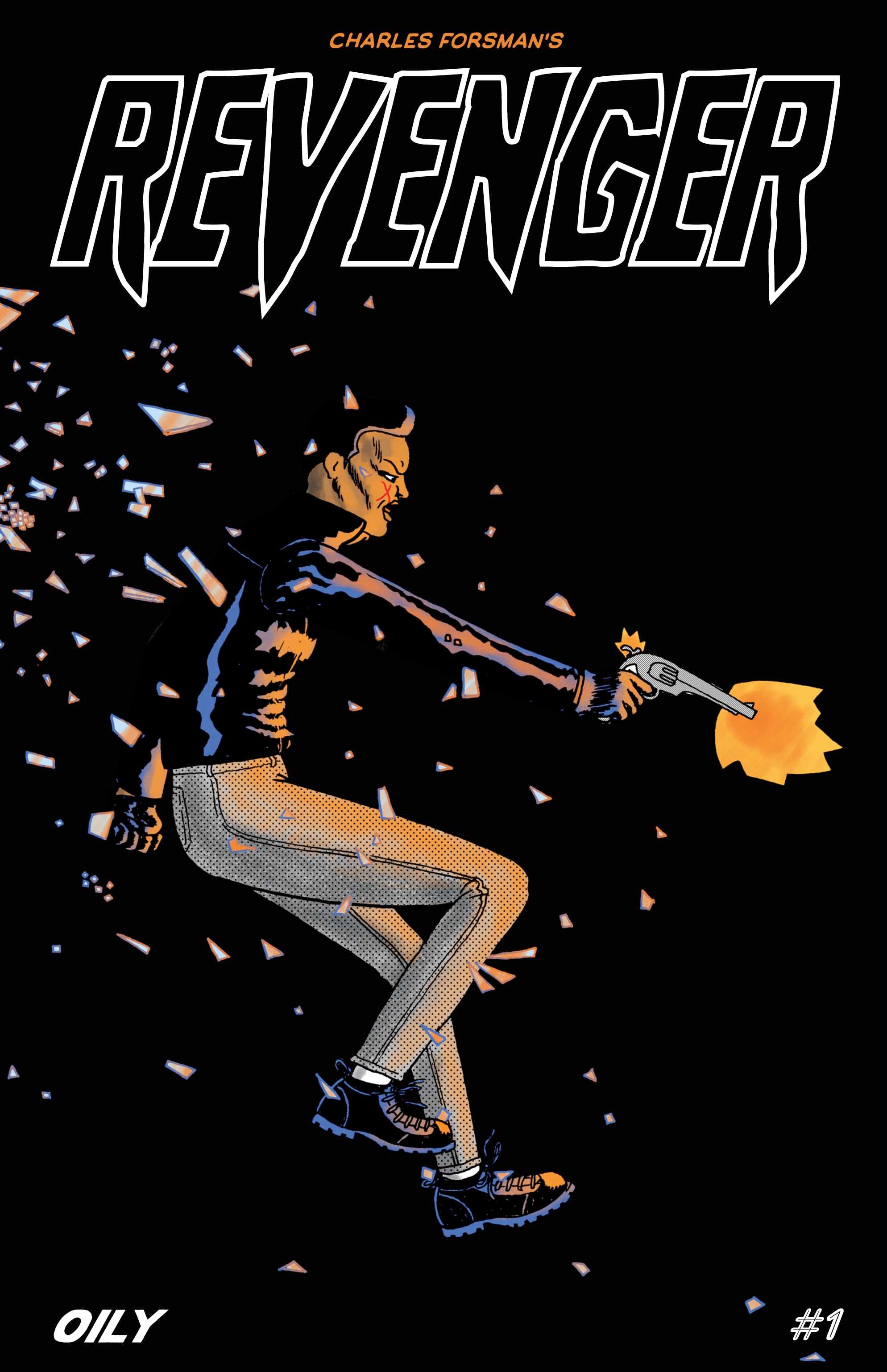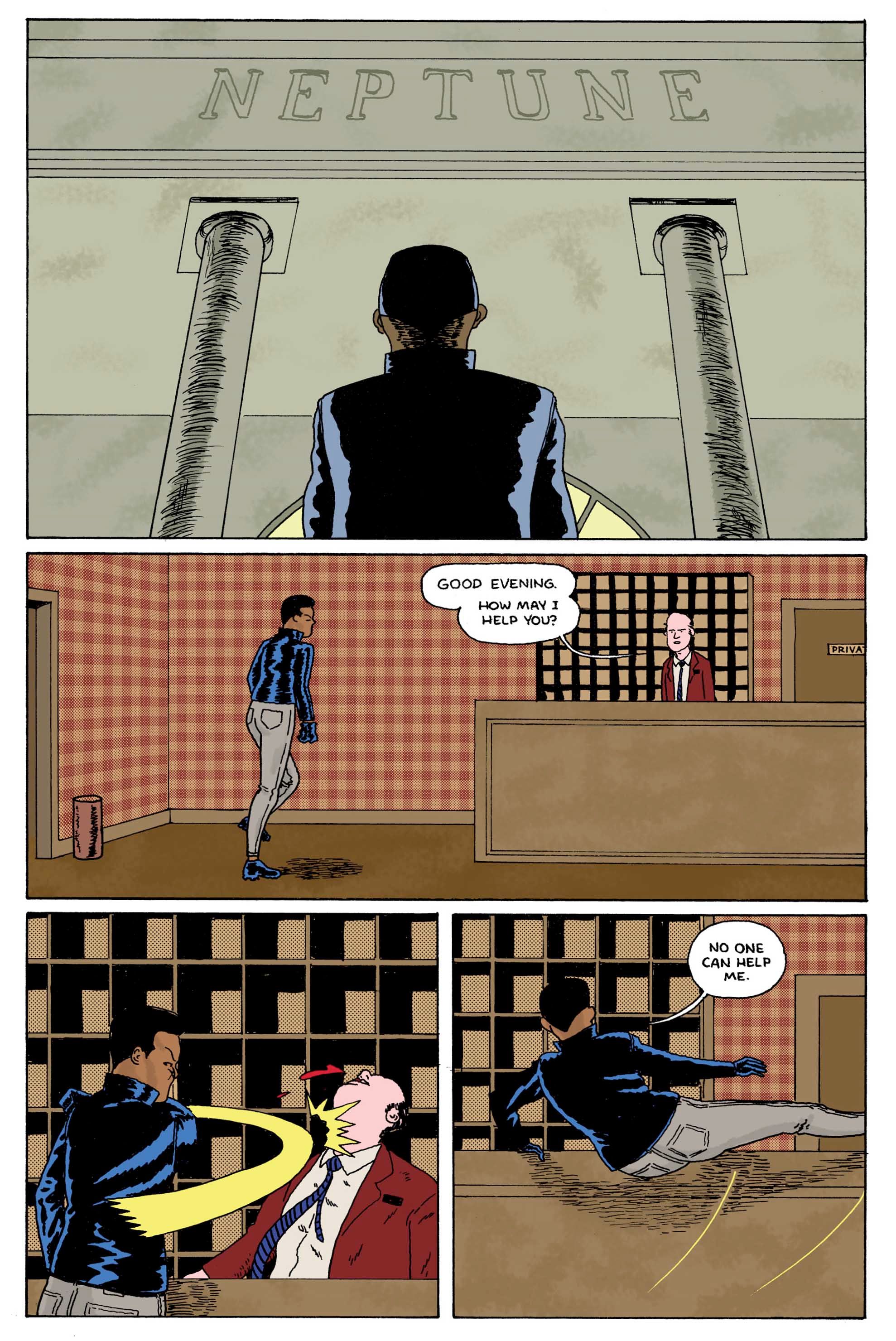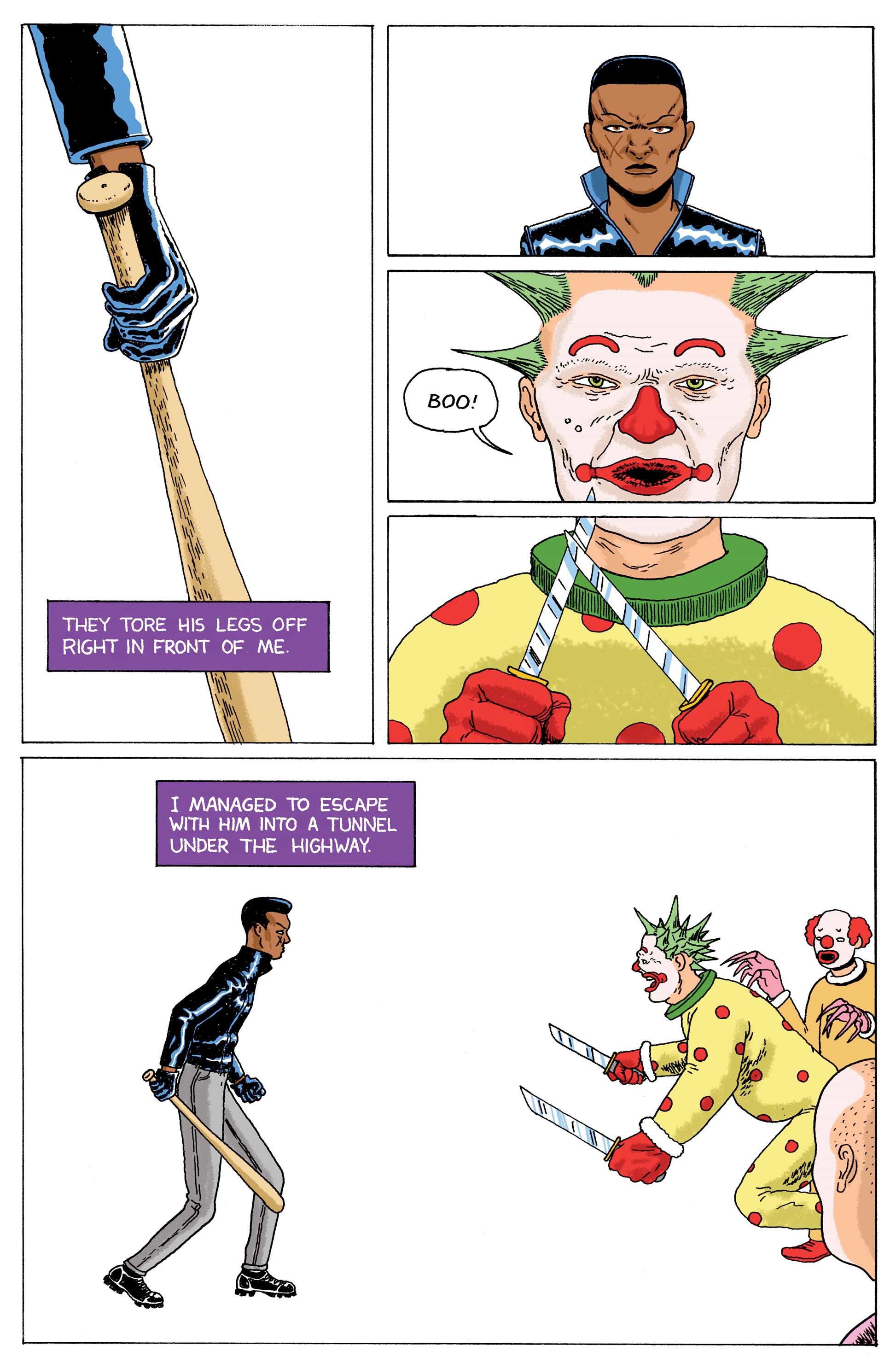Chuck Forsman is shaking things up.
The small press cartoonist (and proprietor of Oily Comics), who won acclaim for his dual teen angst sagas The End of the Fucking World (aka TEOTFW) and Celebrated Summer, has moved away both from the previous slice-of-life subject matter and his simplified art style with his latest ongoing series Revenger. Dripping with tension and more than a little violence, this no-holds-barred action comic stars an Equalizer-esque young woman who attempts to help people in need, often with her fists or other weapons, in a post-apocalyptic America.
Curious over this new direction in style and content, I contacted Forsman.
Robot 6: In the coda to the comic you talk about Revenger taking about a year to produce and going through a lot of stops and starts. Can you walk me through the process and why it proved to be difficult for you?
Chuck Forsman: Well, I was going through a period of self-reflection and doubt. 2013 ended with my second book that year being released by Fantagraphics. I had also started a small little publishing company, Oily Comics. Basically, I had achieved many of the goals that I had been working towards for while. I’m sure there was a certain amount of, “now what?” going on in my head. But I think the majority was I think I was bored with the mode I was working in. And Revenger became the symbol of something new and different for me. It was a challenge. One that I gave up on a bunch of times but for many reasons I kept pulling it back out and giving it another shot.
You cited Michel Fiffe and Ben Marra as influences for Revenger. What was it specifically about their work that inspired you?
Well, I saw two cartoonists that took the comics that they loved growing up and turned them into something contemporary and very smart. And well, very fun. I think I had spent many years sort of demonizing the superhero and action comics I had read as a kid. But I think what those guys showed me was that these things have value and who the hell cares? You know? I historically spend way too much time worrying about what people will think about me. Revenger is my way of saying I don’t care what anybody thinks. I’m going to make the kinds of comics that I feel like making. No matter if they are fashionable or not.
You changed your art for Revenger, adopting a more realistic, dramatic style. Was this a challenge for you in any way and if so, how?
A big part of that year of gestation was drawing and redrawing the same scene over and over trying to figure out how this comic needed to look. Part of that is also learning how much I can do and how far I can push my line before it stops being me but is creating something very different than anyone what you may have seen from me before. For years I had been training myself to be a cartoonist ... meaning to minimize everything and make simple drawings. Distillation. With Revenger, I wanted to draw in a way that I knew was inside of me but I hadn’t shown in a while. I also have a very hard time doing anything twice the same way. I am consciously trying to use a lot of black and be more conscious of shadow and draw those damned backgrounds.
Beyond Copra and OMWOT, what else influenced you on Revenger?
Comics-wise, I think the other folks I have in my head right now are Paul Gulacy and Matt Wagner. I also am seeing a lot of Miller/Janson coming out in the work, which surprised me. But the other influence are movies. I’ve been watching a lot of action and violent movies lately. John Carpenter is a big influence. I draw while listening to his scores of Escape from New York and Assault on Precinct 13. Also films like Ms. 45, Cobra, Terminator ... stuff like that.
Can you talk a little bit about your color choices for this comic? I was intrigued by the saturation of blues, greens and purples -- as well as your use of white in the opening sequence.
Color is something I’ve always wanted to use more of in my work but I think I was maybe too scared of. I spent a long time figuring out how I wanted to color Revenger. I think I’m trying to take a mix of 1980s flat coloring and a bit of that modern Photoshop feel. The coloring is still very much a learning experience for me. I’m not completely satisfied with it but I see myself getting there the further I go.
As for the color choices, I think I wanted a mix of representational but leaning heavy on using color for mood. For instance, I kept that opening fight scene all white except for the characters because I wanted to signal that this was maybe a dream or memory. It is not the present and maybe it didn’t actually happen. It is quite powerful what you can suggest with color or the lack thereof.
You’re adopting a monthly (or at least regular) schedule with Revenger. Why? What does keeping to such a dedicated schedule afford you?
When I was working on TEOTFW I was doing that comic monthly. And that is when I learning that I love serialization and having that monthly goal. I loved interacting with the audience on a regular basis. To me, it is so much more rewarding than working on a big book for two years. I get too stuck in my own head. I like getting stuff out there and seeing how it works. I like having a plan but also working on the fly which is what putting out a comic regularly is all about. It is a great mix of confidence of plan or setup and improvisation that just makes me happy.
How much of the backstory involving Revenger and her world did you plot out ahead of time, and how much are you leaving open for yourself to discover?
I do have a pretty big world thought out for Revenger, insofar and the politics and governments of the world and changing borders. And of course I have Revenger’s backstory, which I will tease a bit and maybe I will go back and tell that story in the future. I was originally going to be a lot more explicit about the larger world but I ended up scrapping that whole story because I wanted to narrow the scope. I think comics can suffer from things getting too big. I like seeing a few characters interact and rather than have what they are doing have bigger implication on the world. Basically, I want to do my version of the '70s Incredible Hulk TV show. I want the freedom to keep going for years on this book or take a break and come back with a new story or just do a one issue story. I want it to be fun.
Has this new approach to your work, affected your approach to Oily Comics at all? If so, how?
I think it pretty apparent that Oily has ramped down this year. I never meant for Oily to become what it is. I love Oily and I’ll still put stuff out but I needed to shrink it. I want to do less publishing and focus more on my own comics. Oily is not dead, it is just slower. And I think Oily is also ... well, it is just me. I think it reflects what I am interested in. I or Oily is not beholden to any market or men in suits. And I want to keep it like that.
What about your other series, Luv Sucker? Will you still be serializing that?
I am finishing Luv Sucker. Obviously it is on a bit of a break because I am really focused on Revenger but I will wrap that series up. It was always only going to be three or four issues long. It’ll surely be a book someday.




